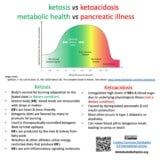Ketogenic diet helps twins improve schizophrenic symptoms

Chris Palmer, MD was a co-author of this 2018 case study which showed an improvement in schizophrenic symptoms in young Ecuadorian twins on a ketogenic diet. They were a male and a female, diagnosed with schizophrenia at the ages of 14 and 18. At the time of the study they were 22 years old.
What can we learn from this study?
A central focus of this study was to assess how the ketogenic diet would affect these patients’ schizophrenic symptoms.
This pilot study employed a 6 week intervention of the ketogenic diet for these two people with schizophrenia. (A pilot study is a small study used to test whether the study question warrants a full-scale investigation. It is a building block for future medical research.) After allowing the twins to adapt to ketosis for 15 days, their psychiatric symptoms were evaluated. This evaluation was conducted by a psychiatrist who was unaware of the dietary intervention.
How did 15 days on the ketogenic diet affect the twins’ symptoms?
First off, they both lost weight. A well known effect of the ketogenic diet.
A second, and more important outcome was an improvement in their schizophrenic symptoms.
How were their schizophrenic symptoms measured?
The measure used in this study was the Positive and Negative Syndrome Scale (PANSS). The PANSS is an assessment used to evaluate the positive and negative symptoms of schizophrenia. It is often used to assess patients in psychiatry. This tool is also used by pharmaceutical companies to evaluate the efficacy of newly developed medications. Therefore, PANSS was an appropriate tool to use to evaluate the effect of this dietary psychiatric intervention.
The case study results
Despite not being able to maintain high levels of ketosis for long periods of the experiment, the PANSS scores improved for both twins. These scores indicate that their schizophrenic symptoms got better. This improvement lasted only as long as the twins stayed on the diet. At the end of the study the twins went back to their normal diet and their symptoms returned. The exacerbation of symptoms while off the diet is a further vote of confidence that it was the diet that spurred their improvement during the time they followed it.
What does this case study mean about keto and schizophrenia?
Because this was a small, pilot study, it does not demonstrate causality. It does provide another bit of evidence to support the idea that more research is called for to explore the efficacy of the ketogenic diet for the treatment of schizophrenic symptoms.
Another case study about the efficacy of the ketogenic diet might also be of interest to you, see Dr. Palmer’s case study. The ketogenic diet and remission of psychotic symptoms in schizophrenia: Two case studies.
See the Ecuadorian twin study for yourself. More on Dr. Chris Palmer’s existing research and how to participate.
More on the connection between metabolic & brain health
- Relieving depression with the ketogenic diet?
- Might the ketogenic diet help fight Alzheimer’s Disease?
- Chris Palmer, MD’s Can a ketogenic diet successfully treat Bipolar Disorder?
- Doris’s chronic schizophrenia put into remission bringing hope to many
- Ketogenic diet helps Ecuadorian twins improve their schizophrenic symptoms
Success stories from the our team
- Metabolic Multipliers
- Captain Malagon
- Cecile’s
- Nurse Christie – My mother’s suffering spurred me to find keto










